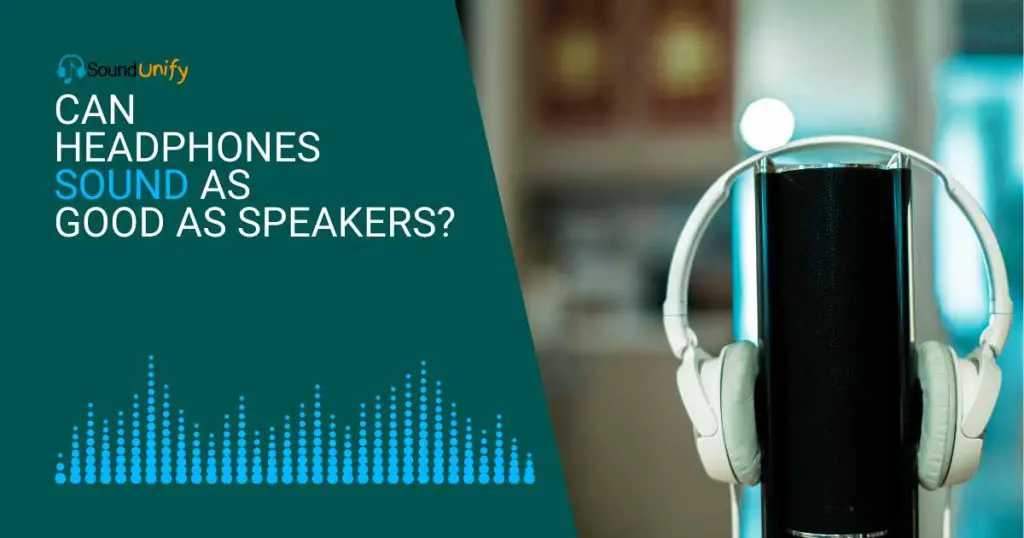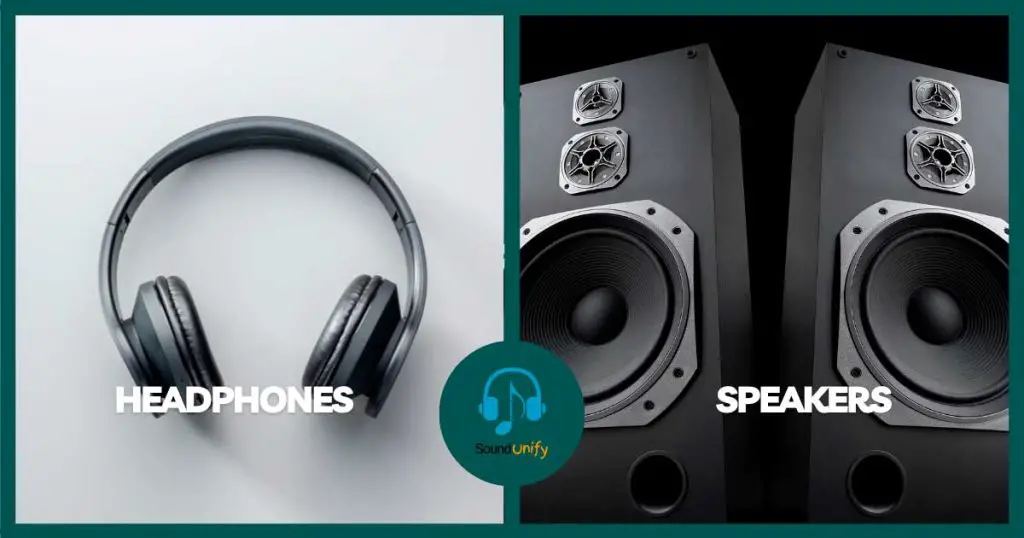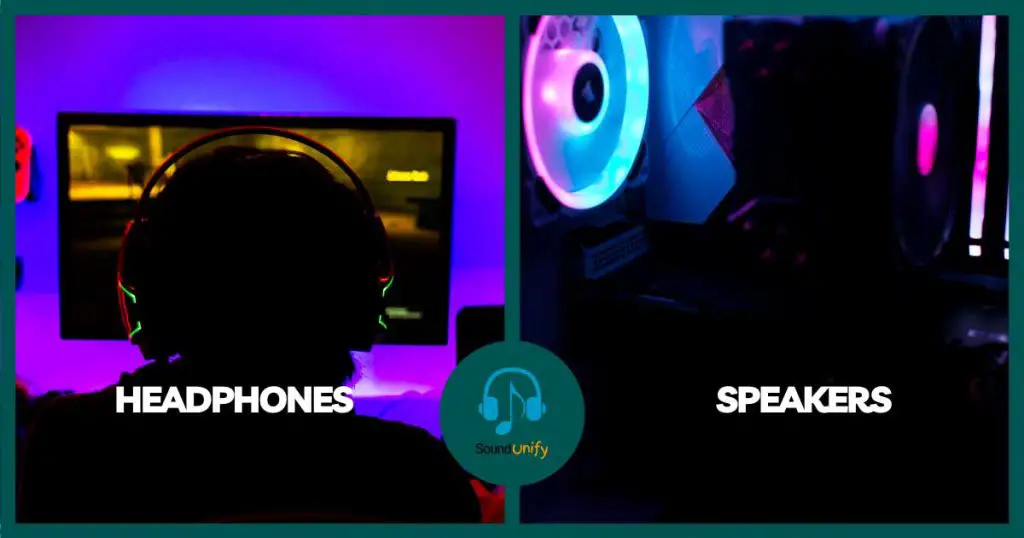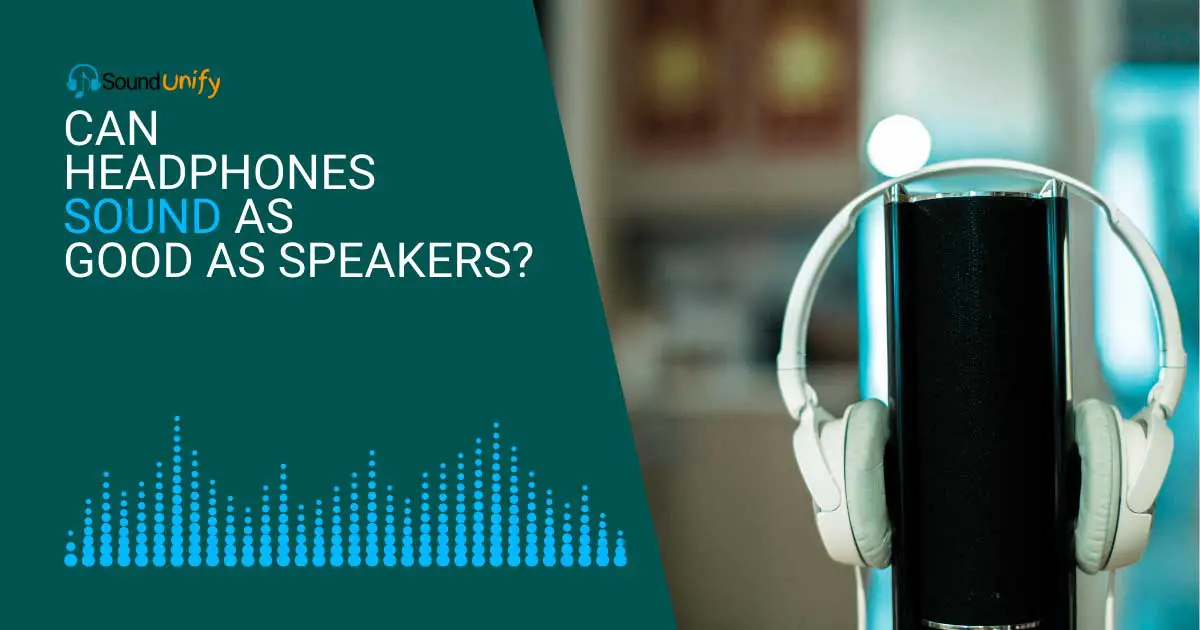Music enthusiasts often use headphones to wonder if they can deliver the same listening experience as speakers.
You can listen to your music with headphones. You may also fill your room with sound using speakers. But can headphones sound as good as speakers?
Depending on the situation, the answer is yes or no. The technology used in high-end headphones to create sound. That outdo even the most excellent speakers.
The sound quality depends on the headphones and the audio equipment used. Speakers may have an edge in room-filling sound and bass response. Headphones provide an unrivaled personal listening experience.
We’ll look at what goes into the sound quality of both headphones and speakers in this article. If you’re a professional audio engineer or a casual music listener, then help you choose between the two options. You’ll find valuable information to guide you in making an informed decision.

Read more: Why Do Headphones Sound Better Than Speakers
Headphone vs. Speaker Comparison
Headphone and speaker technology have come a long way in recent years. It is making it difficult for consumers to choose between them. Headphones offer superior sound quality and provide an immersive listening experience.
Speakers give the convenience of sharing music with others. It’s vital to comprehend the benefits and disadvantages of each to help pick which is the finest for you.

Pros of Headphones
- Personal listening experience: Headphones provide an immersive personal listening experience. That takes work to replicate with speakers. With headphones, there are no sound reflections or interference from other devices. This allows users to represent better a track or podcast’s audio quality and detail.
- Noise isolation: Headphones are the ability to reduce external noise. Headphones create a physical barrier between the listener and outside noise. We make it more enjoyable by making it easier to concentrate on the music. They’re also great for recording because of this. They can help prevent unwanted background noise during recordings.
- Portability and convenience: Headphones can carry around and slip in and out of bags. It makes them an excellent choice for on-the-go music listening. Whether it’s a workout or a commute, headphones are a convenient option to have music while on the go.
Cons of Headphones
- Comfort: Headphones can be uncomfortable to wear over long periods. Poor-fitting or too-tight headphones also strain the ears, causing headaches and discomfort.
- Sharing: With headphones, sharing music with others cannot be easy. This means that users are stuck with a single listening experience instead of speakers. That allows many people to enjoy the music together.
Pros and Cons of Speakers
- Easier to share: Speakers are the ideal group choice since they allow several people to listen to the same source. This makes sharing music, podcasts, and other audio easy without sharing headphones.
- Portable and convenient: Speakers also have the added benefit of being portable and convenient. They are easy to transport and can plug into any device with an audio output.
- Better sound quality: The sound quality produced by speakers is superior to headphones. Speakers come with larger drivers, which allow a fuller and more detailed sound.
Cons of Speakers
- Not great for personal listening: For personal listening, headphones are better options than speakers. Speakers are prone to sound reverberation and interference from other equipment. So, speakers may produce less precise sounds.
- Lack of noise isolation: One of the drawbacks of using speakers is that they don’t provide noise isolation. This can be a problem if you’re in a noisy environment and must focus on the music. Speakers can lead to sound leakage, which can be disruptive in specific settings.
Factors Affecting Sound Quality: Headphone vs. Speaker

Several factors influence the quality of sound produced by headphones or speakers.
1. Frequency Response
Frequency response is an important factor that affects sound quality. It refers to the range of frequencies a sound system can produce. And how it can reproduce those frequencies.
A wider frequency response means better sound quality because more music’s nuances reproduce.
When talking about frequency response in headphones vs. speakers. It’s important to consider impedance. Headphones have lower impedance than speakers. They need less power to produce sound at a given level.
Most headphones don’t have a built-in amplifier. So, they tend to limit their frequency response range compared to speakers.
2. Soundstage
The soundstage is a technical term used to describe the perceived construction of a musical sound. The sound’s width, depth, and focus allow users to determine the direction from which the sound is coming.
Headphones and speakers are designed so their soundstage will also differ. Headphones offer a more intimate and focused soundstage. The sound is almost focused on the users hearing.
So, speakers provide a wider soundstage, allowing users to hear the music from all around them.
3. Imaging
Imaging describes how sound appears in 3D space and is crucial to sound quality. Headphones provide a better imaging experience.
Because the sound is focused on the listener’s head, speakers disperse sound over a larger area, making it difficult to reproduce 3D space.
4. Acoustics
Acoustic performance is one of the most important factors in sound quality. It refers to how well the sound production is and how it comes across. This includes the clarity and accuracy of the sound as well as its dynamic range and loudness.
Headphones and speakers both provide different acoustic experiences. Headphones create a more enveloping and intimate sound. While speakers provide a larger and more expansive experience.
5. Driver Size
The quality of sound produced by a speaker or headphone is tied to the size of its driver. Drivers are responsible for turning electrical signals into sound waves and come in various sizes. The larger the driver, the louder and fuller the sound will be.
Headphones tend to have much smaller drivers than speakers because they must be compact enough to fit within small earcups.
As a result, their sound tends to be thinner and less defined. But speakers usually have larger drivers that are more powerful and can produce louder sounds.
6. Bass Response
Bass response is the ability of a speaker or headphone to reproduce low frequencies. It describes how well a sound system can produce deep bass frequencies.
Headphones tend to have a limited bass response as compared to speakers. This is due to their small driver size, which makes less bass and lower volume than larger drivers. Some headphones can provide a good bass response with an external amplifier.
7. Resonance
Resonance describes the air-filled vibrations produced by a sound system when it produces sound. The resonance of a sound system will affect the clarity of the sound produced.
Headphones can provide a good amount of resonance due to their proximity to the ears. That allows for a more precise sound.
But, speakers may produce too much resonance. It depends on their size and placement within the room.
8. Treble & Sound Pressure Level
Treble is the range of high frequencies that can hear by the human ear and is often referred to as “highs”. Sound pressure level (SPL) measures the power a speaker can produce.
Headphones generally have a more precise treble and higher sound pressure than speakers. This is because they have smaller drivers, which can produce more focused sound waves.
Speakers tend to have a more blurred treble and lower sound pressure level. This is due to their larger drivers, which produce less focused sound waves.
9. Audiophile Perspective
The audiophile perspective is essential when comparing the sound quality of headphones and speakers. Audiophiles prefer an accurate and balanced sound that is free from distortion.
They usually prefer headphones with a flat frequency response and neutral soundstage.
Headphones are the preferred choice for audiophiles because of their superior sound quality and clarity. Headphones can offer detailed and accurate sound with minimal sound leakage and noise interference.
Speakers can also be a good choice for audiophiles, depending on the type of speaker and room acoustics.
10. Stereo Image
Stereo imaging is the ability of a sound system to produce the sound that reflects its source. It measures the accuracy of the stereo field and the sound’s impact on the listener.
A good stereo image means the sound will have an immersive 3D feeling that the listener can feel surrounded by the music.
Headphones provide a more accurate stereo image than speakers due to their closer proximity to the ears. But, speakers need to improve their ability to produce a stereo image due to their placement in the room.
Some speaker setups can offer a good stereo image with many speakers and proper room acoustics.
Headphones and Speakers in Practical Listening to Music

Headphones and speakers are two standard audio systems for listening to music. Depending on the context, each has its advantages and disadvantages.
Listening to music with headphones and speakers offers different experiences. That can affect sound quality in various ways.
1. Listening to Music
Headphones and speakers offer sound quality that can affect by factors such as
- Frequency response
- Soundstage
- Imaging
- Acoustics
- Driver size
- Bass response
The choice between headphones and speakers will come down to the listener’s preferences and the context of the music-listening experience.
Headphones provide an immersive, personal listening experience with superior audio quality. They also offer noise isolation, portability, and convenience for on-the-go listening.
So, speakers are better for sharing and group listening. It can provide a powerful, full-bodied sound when placed in a room.
2. Setup
Both headphones and speakers must be set up for optimal sound quality. This includes positioning the drivers and ensuring the impedance is correct.
Also, ensuring that the room acoustics are not affecting the sound. Proper speaker setup will also ensure that both drivers’ soundwaves come together at the right angle.
3. Experience
The experience of using headphones and speakers can vary. Sure, listeners may prefer the convenience, portability, and noise isolation headphones provide.
Others might like the fuller-bodied sound and sharing capabilities of speakers. The sound quality and the listening experience depend on the user and their preferences.
Comfort
The comfort of both headphones and speakers should also consider. Headphones are often uncomfortable for long periods and can cause poor fitting and headaches.
But speakers are more comfortable but can lead to sound leakage and distortion from outside noise. It’s essential to try out both and ensure they fit before deciding which one to use.
Intimacy
It’s essential to consider the intimacy of the listening experience. Headphones provide an isolated and personal listening experience.
In comparison, speakers can share music and create a communal listening experience. Depending on the context, either one can be the optimal choice.
Ambient Noise
The ambient noise in the room should consider. Headphones provide more effective noise isolation than speakers.
That can be distracting in noisy environments. So, speakers can offer better sound clarity with the help of proper room acoustics.
No matter which sound system you choose. It’s important to consider the factors that affect sound quality, setup, and comfort.
Evaluating these factors will help you find the best audio experience for your particular needs.
4. Room Interaction
Room acoustics will affect how sound is projected and can impact the clarity and fidelity of the sound. Headphones are not affected by the room’s acoustics. And will produce a more accurate sound regardless of the environment.
Speakers affect by the room’s acoustics. That can lead to sound distortion and muddiness depending on the noise level and reverberation time.
5. Types of Music
The type of music being listened to can also affect the sound quality of headphones and speakers. For bass-heavy music, larger and higher-powered speakers offer better bass response than headphones.
Headphones can better represent complex details and nuances in tracks. It’s making them the ideal choice for classical and jazz music.
6. Volume Level
The volume of music listened can also make a difference in sound quality. Headphones can provide a more authentic listening experience at high volumes.
At the same time, speakers can produce a fuller, more dynamic sound at lower volumes. It’s worth considering the volume level when selecting a sound system to get the best sound experience.
7. Personal Preference
It’s essential to consider personal preference when selecting headphones or speakers for listening. Both can offer a great listening experience.
So it’s worth trying different setups to find what’s best for the individual user.
FAQ
Are Speakers Safer Than Headphones?
In general, headphones consider safer than speakers. Speakers will project sound further and louder than headphones. That can be damaging to the ears after prolonged exposure.
There is less sound leakage from headphones than from speakers. So less sound experience by those in the vicinity of the listener.
Why Are Headphones Better Than Speakers?
Headphones are better than speakers for a variety of reasons. They provide a more personalized listening experience by blocking outside sound. And providing a direct path for the sound to hear by the user.
Also, headphones are better for your ears since they don’t deliver the sound as speakers. That can cause hearing damage in the long run. They are more portable and more accessible to store than speakers.
Does the Headphone Jack Affect Sound Quality?
The headphone jack can affect sound quality, depending on the jack used. For example, 3.5mm jacks use for lower-quality headphones.
While 2.5mm or 4-pin jacks use for higher-quality headphones, the quality of the cable used to connect the headphones to the jack can affect sound quality.
Final Thought
Headphones and speakers provide an enjoyable listening experience. So it’s essential to consider the factors that affect sound quality, setup, and comfort before choosing between them.
The best option will depend on the user’s needs and preferences. But it’s important to know their differences to get the best sound experience.
James Dimento is a Chief-in-Editor of SoundUnify. He is a headphone enthusiast and creative writer passionate about audio technology. He has three years of experience writing about headphones and sound quality and is responsible for creating reviews and taking care of all administration.
